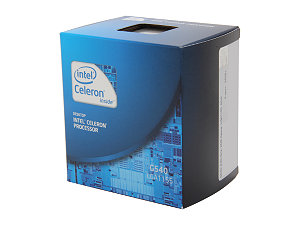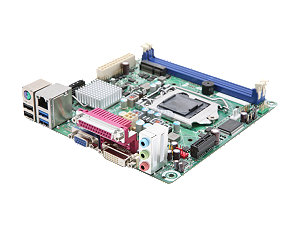Holiday 2012 Small Form Factor Buyer's Guide
by Zach Throckmorton on December 5, 2012 1:55 AM ESTSmall Size, Small Price Tag
While Intel has yet to release Ivy Bridge-based Celeron-class (i.e. cheap) CPUs, I briefly reviewed the Celeron G530's performance in a previous budget buyer's guide. Intel has, however, given its entry-level chips a modest speed bump in that the Celeron G540 and G550 models are often available for a dollar or two more than the G530. Because they are adequate for day-to-day tasks and are priced so low, they remain the kings of the budget CPUs.
 We've paired the Celeron G540 with one of the least expensive ITX Socket 1155 motherboards, Intel's BOXDH61DLB3. While there are less expensive boards, reliability issues prevent us from giving them the nod in this buyer's guide. Intel's entry-level ITX model offers basic features as well as USB 3.0 ports. Note that it does not have a PCIe x16 lane, instead offering a single PCIe x1 lane. This is likely not a concern for a budget, general office productivity box that will likely never need a video card installed but might need a wireless adapter card. Furthermore, its SATA ports are limited to SATA II speeds, so the newest SSDs that use SATA III will be crippled. Again, though, this is a budget system and something has to give. If you need a PCIe x16 lane and SATA III ports, you'll need to step up to a board like ASRock's B75M-ITX or ASUS' P8H77-I.
We've paired the Celeron G540 with one of the least expensive ITX Socket 1155 motherboards, Intel's BOXDH61DLB3. While there are less expensive boards, reliability issues prevent us from giving them the nod in this buyer's guide. Intel's entry-level ITX model offers basic features as well as USB 3.0 ports. Note that it does not have a PCIe x16 lane, instead offering a single PCIe x1 lane. This is likely not a concern for a budget, general office productivity box that will likely never need a video card installed but might need a wireless adapter card. Furthermore, its SATA ports are limited to SATA II speeds, so the newest SSDs that use SATA III will be crippled. Again, though, this is a budget system and something has to give. If you need a PCIe x16 lane and SATA III ports, you'll need to step up to a board like ASRock's B75M-ITX or ASUS' P8H77-I.
Housing the budget build is Apex's MI-008, a longtime favorite of mine for cheap ITX systems. It's reasonably well-constructed, and comes with a serviceable 250W power supply. Its thermals aren't particularly impressive, but for a system lacking a discrete graphics card and running a Sandy Bridge Celeron, it doesn't need to have the best airflow. The MI-008 can accommodate full size hard and optical drives, which helps keep costs down.
 As for the memory, a single 4GB stick of budget DDR3-1333MHz is sufficient for basic computing in Windows 7 64-bit (or Windows 8 if you want to go that route), and leaves an open slot so upgrading to 4GB in the future will be cheap and easy. Hard drive and solid state drive prices are especially dynamic this time of year, making recommendations difficult. While day to day hard drive prices remain elevated in the wake of the notorious Thailand floods, sale prices are beginning to get back to where they were before hard drive supplies were disrupted late last year. If you're patient and pay attention to prices, you will likely be able to snag a mainstream 7200RPM 1TB hard drive for $60 or less. If you don't need much local storage, a 64GB SSD will give you an enormous performance boost for about the same price.
As for the memory, a single 4GB stick of budget DDR3-1333MHz is sufficient for basic computing in Windows 7 64-bit (or Windows 8 if you want to go that route), and leaves an open slot so upgrading to 4GB in the future will be cheap and easy. Hard drive and solid state drive prices are especially dynamic this time of year, making recommendations difficult. While day to day hard drive prices remain elevated in the wake of the notorious Thailand floods, sale prices are beginning to get back to where they were before hard drive supplies were disrupted late last year. If you're patient and pay attention to prices, you will likely be able to snag a mainstream 7200RPM 1TB hard drive for $60 or less. If you don't need much local storage, a 64GB SSD will give you an enormous performance boost for about the same price.
While Windows 7 64-bit remains the de facto standard operating system for PCs, note that Windows 8 64-bit is now also available. Note that for this budget build, the $92 Windows license accounts for about 25% of the total cost. If you're on an extremely tight budget, or simply want to explore other operating systems, be sure to check out a free OS like Ubuntu.
| Component | Product | Price |
| Case | Apex MI-008 | $48 |
| Power supply | (included with case) | |
| CPU | Intel Celeron G540 2.5GHz dual-core | $45 |
| Motherboard | Intel BOXDH61DLB3 mITX | $72 |
| RAM | G.Skill Value 4GB DDR3-1333MHz | $18 |
| Hard drive | Seagate Barracuda 1TB ST1000DM003 | $70 |
| SSD alternate | Intel 330 Series 60GB | $70 |
| Optical drive | Samsung SH-224BB DVD burner | $16 |
| Operating system | Windows 7 64-bit Home Premium OEM | $92 |
| Total: | $361 |
Check the next page for our small form factor file server build.










74 Comments
View All Comments
KAlmquist - Wednesday, December 5, 2012 - link
Sorry about the last post--the Anandtech comment system doesn't like HTML in comments. Here is a fixed version:I'm guessing that the power supply in the budget build is an Apex AL-8250SFX from Allied Leader International, manufactured by Deer Electronics/Solytech. Deer/Solytech is a name you probably recognize only if you read reviews[1] of cheap power supplies for their entertainment value[2].
As far as I can determine, a decent power supply cannot be built for less than about $40. Back in July, Anandtech published "350-450W Roundup: 11 Cheap PSUs." Martin Kaffei's conclusion about the $28 unit: "Some PSUs have no right to exist."[4]
Based on price and pedigree, I'd wager that the power supply in the budget build is crap. If I'm wrong, that's a "man bites dog" story and Anandtech should do a full review of this PSU.
Footnotes:
[1] http://www.hardocp.com/article/2007/10/03/50_power...
[2] http://www.hardocp.com/article/2007/05/23/450w500w...
[3] http://www.anandtech.com/show/6013/350450w-roundup...
[4] http://www.anandtech.com/show/6013/350450w-roundup...
pvdw - Monday, December 10, 2012 - link
My first thought was that the power supply was junk, but SPCR reviewed this case and recommended it. Not that I would buy it, but I'm usually a step above budget builds.Dug - Thursday, December 6, 2012 - link
Try some Wesena cases that look really nice.http://www.shop.perfecthometheater.com/Wesena-chas...
Don-Roland - Thursday, December 6, 2012 - link
>AMD gaming system>AMD gaming
>AMD
hasseb64 - Thursday, December 6, 2012 - link
Come on Zach!A 500W PSU with bronze as a fileserver PSU?
First: A PSU in that application is an investment, smaller and higher efficency is a must!
2: You would NEVER EVER need more than 300W, I would gladly recommend even lower if more were on hand on this broken PSU market.
KAlmquist - Sunday, December 9, 2012 - link
Good catch. I was so surprised to see Zach recommend a no-name power supply in the budget build that I missed this one. He says he chose it because it "is one of the smallest ATX power supplies available." The ST50F-P is 150mm by 86mm by 140mm, which is the standard size for an ATX12V power supply. For the same price or less you could get a high quality Gold rated power supply with the same dimensions and a wattage rating more than adequate for the system. For example, the SeaSonic SSR-360GP (360W) is about $66. That said, if you insist on modular connectors then the ST50F-P might be the best you can do.StardogChampion - Thursday, December 6, 2012 - link
Realan (the folks who bring you the Habey EMC-800/600) also have a nice line of mini-ITX HTPC cases with built-in power supplies. Check these out:http://www.ecosmartpc.com/ei3.html
http://www.ecosmartpc.com/ei5.html
http://www.ecosmartpc.com/ei7.html
Foeketijn - Friday, December 7, 2012 - link
In my experience, the parts that break the most are the powersupply , and then a tie between the mobo, HDD and videocard. I can't remember ever having to replace something else and not having coffee involved. Years ago I quit selling the budget builds, because one out of five systems going bad in lets say three years was just to much troubles for my likings. In most cases you trow in e extra 50 euro (same story probably goes for dollars) and have much happier customers in the long run. Since these days you can really buy a lot of processing power in the budget area I am tempted going for a m-ITX build for the silent tiny office boxes. Only which PSU to select.I am not really confident in selling a system with an ST50F-P when an in-depth analysis from Anandtech (one of the most trustworthy sources) says:
"Most capacitors are made by CapXon and OST; these are very cheap capacitors compared to other brands and may not hold up as well long-term."
Especially in a fileserver, I don't get skimping on the power supply.
Ideally I would take an low power, silent part designed for workstations/servers. Only they are as far as I can find not in ATX size.
Is there a good alternative when the bar for endurance is a bit higher?
Wrathgar11 - Saturday, December 8, 2012 - link
Great write-up. SFF has been a central feature of computing to me for some time.My fileserver is a Mini ITX Supermicro X7SPA based system in a Fractal Core 3000 case (used with various larger boards beforehand), my media PC is another atom based system in a Node 304 case and my desktop is a DH61DL based i3 unit in a Core 1000 case.
All are mini-itx boards, two fanless and silent and all very reliable (the HTPC and desktop have no moving parts, are SSD equipped and also run silent Pico PSU's).
My gaming system is a PS3. That uses more power than the 3 PC's combined.
philipma1957 - Sunday, December 9, 2012 - link
FIRST off the asrock z77e-itx is a great board but it should have a crucial msata 256gb ssd.it has sold as low as 169. that adds 100 bucks to the price. no need for the 1 tb hdd in a gamer.
second the cooler master case fits a hd7970 so just do it.
that adds 200 to the price.
third the cooler master elite needs 1 mod a 4 inch circle saw cuts a hole right where the cooler master logo is put in a cheap grill
and temps drop 5-10c. this saves you 20 over the bitFenix case.
fourth a full size psu drops in cost of 75 to 90
so price is about 1200
but top of the line cpu
top of the line graphics card and a full sized psu. if you want to cut costs get the hd7950 save a hundred 1100 gives you a full
powered gamer. I like this cooler master build so much I have 3 of them under my belt.